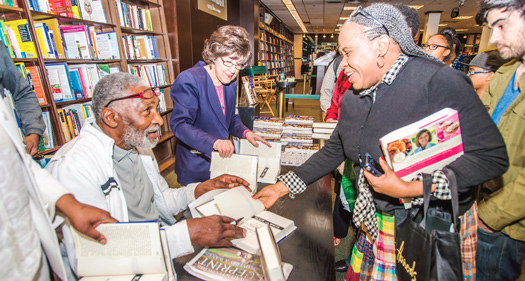By Saeed Shabazz -Staff Writer-
Richard Williams writes about life, race and reality

NEW YORK (FinalCall.com) – Richard Williams, best known as the father of tennis champions Venus and Serena Williams, has written his first book. It isn’t about how to play tennis.
“There are enough books out about tennis–tired of teaching tennis, tired of talking about tennis,” Mr. Williams told a standing-room only crowd at a mid-Manhattan Barnes & Noble bookstore May 7, the day after the release of “Black and White: The Way I See It.”
“I wanted to write a book of encouragement; the importance of my life and who I really am,” the 72-year-old icon said proudly.
In the book, Mr. Williams looks back at the 2012 Wimbledon championship match, and how Serena had to overcome a life-threatening medical problem to reach the final: “That morning so far from the place I was born in Shreveport, Louisiana. Wimbledon, with its White rule and its traditions and its royalty, was the other end of the world. Yet, were things so very different? In tennis, just as in Shreveport, there was a crowd and I had often heard it grow ugly.”
The interview with The Final Call ended with Mr. Williams noting that every race in the world with the exception of the Black man in America “knows a lot about themselves.” Blacks in the U.S. would be more independent if they knew their history, he said.
“I still hear people calling me ‘n—-r’, I don’t know why people are calling it the ‘n’ word, call it what it is,” he told The Final Call, during a quick 15-minute interview.
Mr. Williams had been in New York City since May 4 promoting the book and was scheduled to travel by train to Philadelphia right after his May 7 book signing.
“My mother made me leave Shreveport because she was afraid I would get myself killed,” he said, doubling up in laughter. Born February 16, 1942 to Julia Mae Williams, he was one of six children, and the only boy.
During his talk before the book signing he spoke of being beaten by a White man at age five-and-a-half, because he dared to touch the man’s hand while giving him money and another beating by a White man at the age of eight. “The most important lesson from this was that my mother would never allow me to use White folks’ prejudice as an excuse for failure,” he said.
“From that I learned not to allow anyone to define how and what I would do in life,” he told The Final Call. In the book Richard Williams shares a poem he wrote especially for Serena during her illness:
“Step forward so you can see
the light of day and know
you are capable of
conquering fear, defeating feelings of inadequacy,
and rising above life’s circumstances.
One who is able to prevail
Is a shining example of
power, strength, and confidence.
It’s just a matter of faith.”

Richard Williams also shared how one night he decided to dress up as a KKK member and attend a rally at the age of nine. They were getting ready to lynch a Black man. “Well, I was able to get him out of there with my squirrel gun; and believe me I rode my bicycle faster than ever before. And that is the beginning of my thinking in Black and White,” he said.
Mr. Williams has no problem addressing the perception of him as an “angry Black man.” “Listen here, anger was my life: the Whites Only, Colored Only signs. You never knew, being a Black man, what would happen to you,” he stressed.
Mr. Williams left Shreveport and headed to Chicago, later to Lansing, Mich., and finally to Compton, California–always an entrepreneur, always following his own dictates.
“I taught tennis to my daughters by reading books and teaching them dedication, commitment and responsibility,” he said.
When a member of the audience asked why he never allowed Serena and Venus play on the Junior Tennis circuit, he said: “I witnessed how badly those young people behave and talked back to their parents; so I decided that wasn’t the way I wanted to raise my girls.”
Teaching children accountability is the greatest lesson, next in line is loving children, Mr. Williams insisted. “But, never take away the lesson of responsibility from your child,” he stressed over and over during his talk. And, Mr. Williams added, allow them to make a mistake.
“Some people call me a tennis coach; well, I have always been a father first,” Mr. Williams said. “I have worked hard to be a good father to my daughters, because I wanted to know how it would feel to be a good dad–me not having one.”
Looking out into the audience, he declared, a dad is not someone who just makes a child!
The Final Call asked if he ever had an opportunity to talk to the late Earl Woods, father of golf champion Tiger Woods. “We met briefly a couple of times, but I always wanted to ask him how did he see it (American racism), how did he put the program together for his son to follow,” said Mr. Williams.
The interview with The Final Call ended with Mr. Williams noting that every race in the world with the exception of the Black man in America “knows a lot about themselves.” Blacks in the U.S. would be more independent if they knew their history, he said.
Asked his opinion of “Muhammad’s Economic Blueprint” as presented by the Honorable Minister Louis Farrakhan, which calls for 16 million wage earners to give 35 cents a week to amass over $291 million in one year for Black economic development, beginning with the purchase of farmland, Venus and Serena’s dad responded: “Min. Farrakhan is an unbelievable man, a blessing from God. He doesn’t speak on an issue unless he studies it–knows the marketplace. I admire Min. Farrakhan.”
How important is getting land? Mr. Williams grew up in Shreveport picking cotton alongside his mother as a sharecropper on a farm. Land ownership is imperative, he said.
Someone in the audience asked Mr. Williams, why there aren’t more Black tennis players in the U.S.? “Racism and fear,” he said emphatically. “Look, if the door was opened for more Blacks, they would dominate tennis just like in other sports,” he noted before breaking into a loud laugh.
“One thing you can count on from Richard Williams is the truth,” he said. “And where did I get that from: my mother.”
“Oh, yes, America is the most prejudiced place in the world!” Mr. Williams added.












